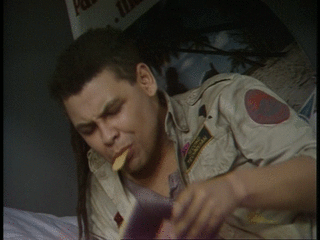by Jas Faulkner
It might seem like a needless bit of sophistry to contemplate the evolution of the definition of “book.” We all know what makes up a book, right? Say the word, “book” and the immediate association for most is still an aggregate of leaves bearing printed information, bound together with front and back cover that is bound between covers that are often made of sturdier materials. At least that would be the case for my generation, that cuspy mini-tribe born during the during waning days of the Baby Boom and just too soon to be considered proper Gen-Xers. They’re books. You know, those things with pages and covers and words and pictures.
Who am I kidding? Even I’m beginning to flex and stretch the meaning of the word.
A friend’s teen daughter overheard our discussion of Librarything, a site devoted to the cataloging of personal libraries and all things bibliophilic. She brightly informed us that she had a membership and invited me to see her collection.

In the world of BBC’s Red Dwarf, books are printed on pages, but the information is conveyed by smell instead of abstract visual elements such as words and pictures.
Weighing in at nearly two thousand volumes, it was pretty impressive. I asked her what her library space looked like, imagining some clever shelf construction given her talent for building furniture.
“It’s here!” she said, tapping at the tablet she’d set on the table in front of me. “I still have a few paper books from when I was a kid, but most of these are Kindles.”
Oh.
I now understood my father’s consternation at trying to reconcile vinyl LPs with my own shiny silver discs as “albums.”
After the girl left, I asked her father if he included e-books in his LT catalog.
He did, but listed them under the category of “read but not owned.” I admit to doing the same thing with e-galleys that I review. Some of them truly fall under that category. They are loaned rather than given, due to an expiration date that renders them unreadable after a certain length of time.
But what to make of e-books? When we view them as something that is not quite a real book, are we echoing the attitudes of readers in the post-Gutenberg world who may have viewed mass-produced books as something just short of an abomination? Book construction is still considered an art in some circles but the notion that wisdom that could be lost forever is somehow being protected by making those thoughts physical by writing them down is part of the process most of the time. It poses some interesting questions about the ethos of books as a physical art and craft.
Will the contents and purpose determine the form? Will the production of paper books be something reserved for certain kinds of content? There is a part of me that sees it as a needed component of a more sustainable future. The idea that books are seen as less disposable appeals. However, it makes me wonder about the margin for error in a larger cultural sense. How bad could it be if we veer off into the wrong direction when it comes to what is left to the future? What if we get it horribly, even hilariously wrong?
Yeah. I’m going to sleep tight thinking about that, too.

